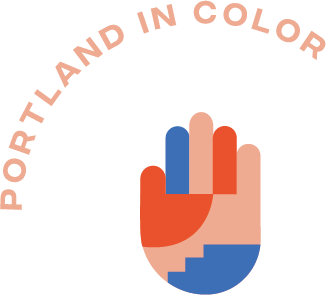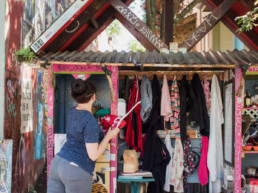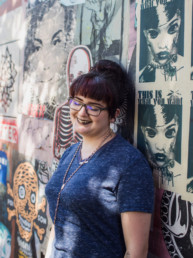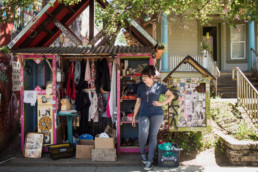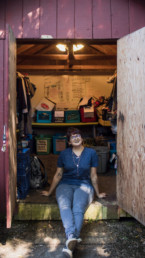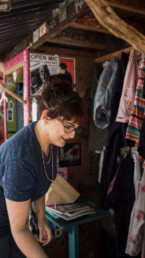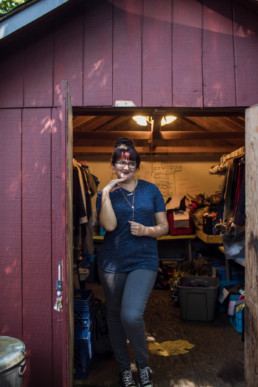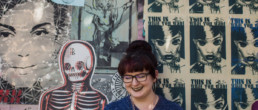LYDIA MARIE GRIJALVA
“It’s people-powered magic.”
Name: Lydia Marie Grijalva
Pronouns: They/them or she/her. “They” makes me feel sparkly and good.
Background: Chican@
Karaoke jam: I don’t have one! I mostly just sing in the shower when I’m home alone. There, I have more of a repertoire.
The heart of this series is community, or rather, work toward becoming a stronger community. The magic of community is its ability to help us see more of ourselves through like-minded people and build each other up. And perhaps that’s what community is meant to be, but here in Portland it feels special in a different way. Maybe it’s because as people of color, we’re all grasping onto the thinnest threads of self recognition in a town that doesn’t see us. Maybe it’s because we’re our own key to survival. Maybe it’s because we’re only our most powerful when we see ourselves in this light.
Lydia is part of the community in a unique way— namely in that their art is centered on building it. Whether through organizing volunteerism, being a voice for others, or articulating the complexities of social justice, all of their work is for the greater good of a more inclusive and responsible place to call home.
(Note: There are a lot of calls to action in this post through Lydia’s work! Please see how you can give directly to the Portland POC communities by donating and supporting Know Your City, Alberta Free Hutch, and Men’s Assembly for Collective Accountability.)
“Honestly, I’m inspired by my community. Like, it’s ridiculous. How dare everyone I know be so talented and beautiful.”
Medium of choice: I dabble in many things, but right now, I’d classify my focus as social art, community art, and placemaking. In these pictures, we’re standing in front of the Alberta Free Hutch, we have been running for a couple of years. This used to be an active space for free boxing, and then it went through a few phases and became the AFH. There have been so many changes on Alberta, it rests on land stolen from Native folks, and is one of many Portland streets with a history of displacing Black folks. We wanted to make sure that this brightly colored free-stuff space existed to juxtapose the expensive, bland cream-color-with-airplants trend taking over Portland. My main goal has been to ensure people of color and low income folks in the neighborhood have a place that they know they’re cared for, and can get their needs met. Interestingly, the more affluent the community becomes, the more unusable items people dispose of in here, and the more it gets abused. It seems like when more people who have less use the space (especially femme-aligned folks and poc), we see more people inclined to tidy when they take, and give things that are special- it feels like more personal gifts. It tells me that they understand it’s people powered, and that there are humans on the receiving end. When the neighborhood gets new, more affluent neighbors, we get a peculiar mix of some VERY nice stuff, and way more unusable stuff (I really don’t understand who thought that their un-scooped kitty litter was a nice gift). It sends a message that maybe people think it’s run by magic… And in a way, it is! But it’s people-powered magic. We’ve recently taken it down, as it’s been an awesome learning experience (public exhibit, even?), but it wouldn’t be sustainable for us to do forever. Next, we’ll be focusing on POC led creative reuse workshops. We’re hoping to get that happening by the end of this year. I do more traditional art too, but I’ve made a point of burning all of my portfolios.
Tell us about one of your favorite Portland memories: This is actually my second time moving here, but it feels like I lived each of those parts of my life in 2 different cities. The first time, I was coming out of houselessness, and surrounded by lots of very thoughtful and helpful white people, and it was hard (even though I met a few of gems). I felt tokenized, and like I was a pet project to someone because I was poor, brown, and had enough trauma to go around. Moving back the second time, I was coming out of houselessness again (hashtag oops), but this time able to settle quicker and find community of color. I’m still blissed out from how much I love my community here. The moment where first I walked into a room of all POC creatives and a table of homemade food… I still haven’t come down from that moment. Every time I think of it, my life gets a year longer.
How do you stay inspired in Portland?
I’m fortunate to know so many amazing people. I recently got promoted to Interim Executive Director at a nonprofit called Know Your City. KYC uses tours, panels, publications, and our youth programming to fulfill our mission: “engag[ing] the public in art and social justice through creative placemaking projects. Our programs and publications aim to educate people to better know their communities, and empower them to take action.” I meet so many people through this work that keep me inspired, along with my work being an advisor to the Men’s Assembly for Collective Accountability, and working on the AFH (and the following workshops). I’ve met so many great people through this work that I cry just thinking about it. Honestly, I’m inspired by my community. Like, it’s ridiculous. How dare everyone I know be so talented and beautiful.
Please share a time it was difficult living in Portland:
I mentioned being without housing. Each time I was in that position, it was because I believed it was a sacrifice I had to make to go to school. I have a rare chronic illness, and I wanted to be a doctor because I gained so much from my struggle getting diagnosed with Ehlers-Danlos syndrome, and I have tons of ideas of what treatment and management could look like. The first big hit was when I was carrying all of my belongings with me, including me 12 lbs dog in a gym bag. I was in line at the financial aid office, trying to figure out when to expect money so that I could find somewhere to sleep. After learning that I had been misguided completely about how financial aid worked, the person at the window told me that he couldn’t help me because “People of [my] demographic just take longer to go to college”. It was extra infuriating because I later learned that they were advertising “more Latino enrollment than ever before,” even though they did nothing to support us and we have the highest dropout rates. Here I was, more openly desperate than I’d ever been, I was carrying with me literally everything that I owned, and he wouldn’t help me except to name a matching statistic to my situation. He openly didn’t care. I eventually found a nice white lady to get in line and ask him for the form I needed. She got the form easy, no questions asked of her. She wasn’t even a student! It was so disheartening.
How can Portland support you and/or your community? This last year, all of my projects have seen such a wild amount of growth. At Know Your City, we went from serving 24 students to almost 400 students in a year (all at majority POC schools). We’re still catching up from that growth. In fact, if you know anyone who could donate a REALLY GOOD colored printer, we would be eternally grateful. You can also become a member, attend a Know Your City walking tour, buy our Oregon History Comics or projects such as diverse children’s books on our website. In addition to supporting my main squeeze Know Your City, you can also attend a Men’s Assembly training (we’ll be speaking and facilitating at Engaging Men at Reed College 10/14), and follow the Alberta Free Hutch on Facebook to be the first to know when our workshop dates are released. If you want to contribute to my coffee fund, my venmo is @lyddlemami. Thank you so much for reading!To support more of Lydia’s community work, visit Know Your City, Alberta Free Hutch, Men’s Assembly for Collective Accountability, or donate to her directly.
Find value in what you’ve read? Donate to Portland in Color to keep the series going.
